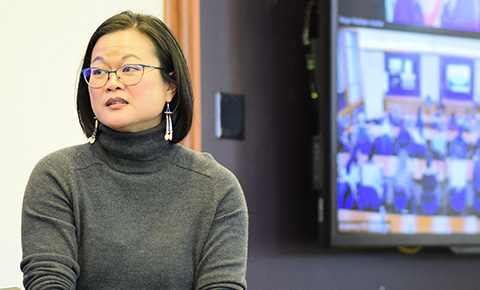OiYan Poon: Asian American is Not a Color

OiYan Poon once dismissed those in her Asian American community who opposed race conscious admissions. They were an anomaly, she thought, a statistical minority.
But when she complained to a colleague about the attention they received from mainstream media, he asked a simple question: “Have you ever talked to them?”
Poon, a race scholar and author, accepted the challenge. Her findings, which are included in her new book Asian American is Not a Color, Conversations on Race, Affirmative Action, and Family, were eye opening -- even after two decades studying race, she said during a talk at Northwestern University’s School of Education and Social Policy.
“Both the opponents and supporters of affirmative action had no idea what they were talking about,” Poon said. “Across the board, a great majority of people believed myths.”
In a wide-ranging conversation, Poon elaborated on this research and more with School of Education and Social Policy Dean Bryan Brayboy. Their discussion centered on how to build a diverse democracy in the wake of the U.S. Supreme Court’s 2023 decision to strike down race-conscious college admissions.
“The ruling never said diversity was not a good goal. And it never said new tools can’t be created,” Poon said. “So how can we use imagination and creativity to come up with new systems and workflows? We need different approach in our work to advance diversity.”
Poon began writing Asian American is Not a Color, after her daughter began asking questions such as, “Mom, are we Black?” and “Are we colonizers?”
Her book combines research with personal narratives and interviews with Asian Americans throughout the US who were actively engaged in debates over race conscious admissions or affirmative action.
One of her findings highlighted the contrasting views within the community. Supporters of race conscious admissions or affirmative action saw racism as a systemic problem that required systemic solutions, she said.
Opponents, who were largely Chinese American and mostly male in her research sample, defined racism as an individual problem; racial disparities in education, for example, could be solved by working harder.
She also found people in both camps who believed that race-conscious admissions was practiced through quotas and extra points for applicants identifying as under-represented minorities. But quota systems were deemed unconstitutional in 1978; the points system ended in 2003.
Then, when she asked them to describe their ideal system of selective admissions, “they basically described race conscious, holistic admissions,” she said.
Poon, co-director of the College Admissions Futures Co-Laborative, was a lead co-author of amicus briefs defending diversity and race-conscious admissions, submitted to federal courts, including the Supreme Court in the Students for Fair Admissions v. Harvard case.
“People are affected differently by the same evolving oppressive system,” Poon said. “To have a proper solution, we need to understand systemic racism and its complexities and different dimensions, and we have to use each communities’ stories as windows into how that system works."
Photo by David Johnson